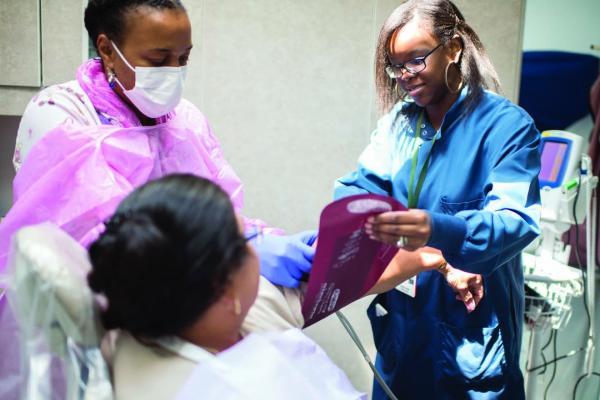July 28, 2016

Angela Daniel, Codman Academy summer intern, assists Yolanda Burell, Clinical Care Coordinator, with taking a patient’s blood pressure in the Dental Care Department at Codman Square Health Center. Scotland Huber photo
They used to brush silently past one another, scurrying straight-eyed toward a table of familiar faces.
But now at the Codman Square Health Center dining room, employees mix freely with Codman Academy students who share the facilities, many of whom have worked for them in summers and semesters past.
“Initially, people were like, ‘Oh my goodness, I’m staying away from these students,’” said Sandra Cotterell, 58, a Mission Hill native and the CEO of Codman Square Health Center. “Now the staff are mingling with them, they have no problem using the dining area. We have evolved as a health center and school community, and now they’re assimilated. It’s OK to dine with them.”
A collaborative internship program between the charter academy and health center, which places students under supervisors of various departments, ranging from phlebotomy to patient relations, began 10 years ago and has bound the institutions together while providing students valuable professional experience, administrators say.
For many students, being thrust into a professional setting has been transformative. “There’s lots of research that says getting kids into a professional setting can really change their ideas about what’s possible in their lives,” said Meg Campbell, the Codman Academy’s chief of strategy and innovation, “because maybe in their social circles, they don’t know any doctors or lawyers or what have you.
“At their internships, they wear professional dress, wear ID tags, are expected to speak in a professional manner––they blend right in, which is the point of it,” said Campbell.
After interning at the health center’s phlebotomy center last summer, Emmanuel Obianigwe, who graduated from Codman in the spring, has set his crosshairs on medical school, a path he’d never envisioned.
Before, according to school employees and administrators, he had been temperamental, lashing out at teachers and getting into trouble with authority. In middle school, he’d been placed on probation by the courts.
“I constantly dragged my mom out of bed to attend my court dates every other week,” Obianigwe said in his senior year during a speech in which he later broke down in tears. “A police officer would come knocking on my door promptly at 8 p.m. every two days to make sure I followed the rules of my probation.” At his internship, Obianigwe took his job seriously and, in turn, patients took him seriously.
He liked that feeling. One patient even mistook him for a doctor, and multiple school administrators said Obianigwe emerged from his internship a changed man.
“Oh my gosh, it changes kids, just changes kids,” Campbell said. “Kids that frankly are oppositional at school – getting in trouble, blowing off their academics – once they get a job and are getting paid and have to show up on time and present a neat appearance, they start to become more responsible, confident people. And they like that new person that they’ve become. It changes their view of themselves because other people are viewing them differently.”
With funding from BlueCross BlueShield of Massachusetts and John Hancock’s MLK Summer Scholars program, the health center has employed 16 Codman Academy students and recent alumni as interns this summer, the most in program history.
This is no fluke.
A decade ago, Cotterell had to push hard to persuade employees to take on interns; that’s no longer the case today. “There are more requests for students than we have students,” she said. “As soon as they know we’re placing students in the summer, I have volumes of managers requesting them.”
Jo-Ann Silva-Winbush, a 54-year-old Jamaica Plain resident and the health center’s director of operations, is one of those managers. The teenagers, who have, she said, been “speaking the language of technology since they were born,” import that savvy, cutting the time it takes to complete some tasks in half.
One student, for instance, taught Silva-Winbush how to add up the numbers in an Excel column with the click of a button; before, she would manually plug them into a calculator. “Some of them did a better job than people on staff; that’s the reality,” she said. “I learn a lot from them, too.”
Villages:
Topics:


